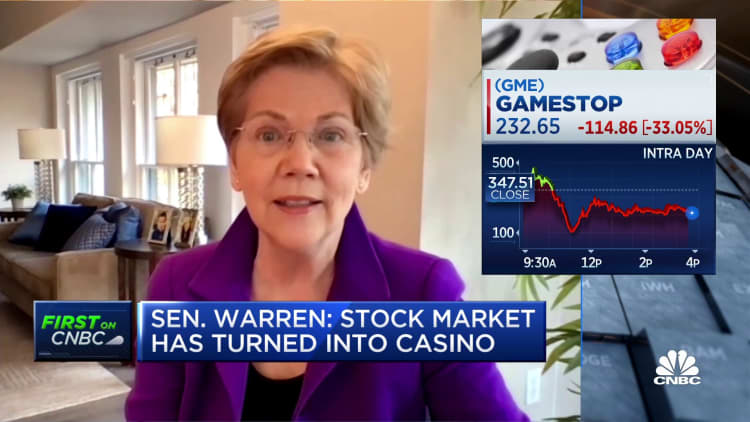Sen. Elizabeth Warren on Tuesday asked Robinhood in a letter to explain why it restricted trading in red-hot shares of GameStop after hedge funds suffered huge losses in a short squeeze.
Warren, D-Mass., noted that the online brokerage last week abruptly changed trading rules for individual investors in certain stocks on its no-fee platform, while hedge funds and Wall Street institutional investors were allowed to keep trading in GameStop, Koss, AMC Entertainment, Express, Naked Brand Group and other companies.
"Robinhood has a responsibility to treat its investors honestly and fairly, and provide them with access to the market under a transparent and consistent set of rules," Warren wrote in her letter to Robinhood CEO Vladimir Tenev.
"It is deeply troubling that the company may not be doing so," wrote Warren, who is a member of the Senate Banking Committee.

The letter asks Robinhood to disclose what led it to impose tight trading restrictions on the video game retailer GameStop and the other stocks, and whether its hedge-fund investors or other financial services partners who had big stakes in such trading affected the app company's decision.
Robinhood had sharply limited the buying of a handful of stocks, in some cases allowing customers to buy only a single share. It also hiked margin requirements on certain stocks and options.
"The public deserves a clear accounting of Robinhood's relationships with large financial firms and the extent to which those relationships may be undermining its obligations to its customers," Warren wrote.
The senator also wrote that she was "troubled by Robinhood's inclusion of forced arbitration clauses in its customer agreement, which suggests that investors will not have sufficient opportunity to pursue their claims and seek relief."
At least 18 lawsuits have been filed against Robinhood in the past week over its trading restrictions.
Warren wrote that forcing those claims into "secretive arbitration processes deny customers a fair hearing, undermine public accountability, and hamper efforts to assemble a thorough and complete understanding of events."
"Investors harmed by Robinhood's trading restrictions should be able to argue their case in court, rather than in closed-door proceedings that are too often rigged against claimants," she wrote.
A Robinhood spokeswoman did not immediately respond to a request for comment about Warren's letter.
Warren's letter came on the same day that Robinhood said it would allow clients to purchase up to 100 shares of GameStop, while also raising limits on AMC and Koss and eliminating restrictions on BlackBerry and Genius Brand.
The price of GameStop shares exploded upward by 400% last week, ending January up more than 1,600%, due to a group of investors on Reddit's WallStreetBets discussion group hyping the stock.
The massive increase in share price in turn created a short squeeze on hedge funds that had bet GameStop's share price would fall, requiring those funds to buy shares to cover the losses on their positions. Those purchases in turn increased upward pressure on the price of the shares and further exacerbated the hedge funds' losses.
Short sellers lost almost $20 billion on GameStop positions last month because of the squeeze.
Short sellers make bets on a stock by borrowing shares that they then sell. A short seller hopes the price of the shares then falls, so that when they later buy shares to replace the ones they borrowed the short seller can pocket the difference in price.
But when prices rise, a short seller must buy shares to replace the ones they borrowed at a higher price than they first sold at. That situation results in a loss for the short seller.
Many individual traders and politicians on both sides of the aisle have criticized Robinhood's decision to restrict buying in certain stocks such as GameStop that are at the center of the controversy.
Tenev, the Robinhood CEO, last week told CNBC that his company had limited 13 stocks on Wednesday as a risk-management decision to protect the firm and its investors.
Tenev said that the decision was partly based on net capital rules by the Securities and Exchange Commission and clearinghouse deposits conditions with which brokers must comply.
Last week's heavy trading volumes put pressure on online brokerages such as Robinhood, which are required to pay customers cash when they close a position.
The brokerages also needed additional cash to supply their clearing facility with additional capital to protect trading partners from outsized losses.
GameStop share prices fell Tuesday, sliding 51% to about $110 per share as of midday.
That sharp tumble follows a more than 30% drop during the regular market session Monday.
GameStop's stock price closed at $325 per share on Friday.
If GameStop closes at current levels, it would bring its two-day loss to roughly 66%.



